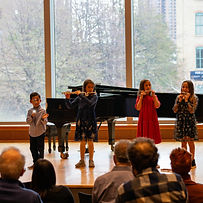
VANAMALI MEDINA
educator, flutist
Study
Individual lessons are always tailored to your needs, interests, and life stage. Whether you want to play your favorite songs, discover new music, improve your tone and technique, or get tips on making your home practice more efficient and enjoyable, lessons will give you a clear path to reaching your goals. For more information on what a typical course of study might look like for you or the flutist in your life, read more below!
Lessons prepare you to be not just a flutist but a whole musician, an ensemble partner, and to play music your way for the rest of your life.
All students are invited to perform in recitals, attend studio events, and supported in their involvement in the larger music community. Most students participate in school ensembles, community bands, and GTCYS or MYS. While I never require auditions, those in my studio who choose to pursue these opportunities are consistently selected for All-State participation, regional honor bands, and have won local competitions and scholarships, including for college study.
Studio Membership Includes

Loaner Instruments
Never get stuck without a flute! If your instrument is in the shop or you need a more affordable rental option, I keep a small store of student flutes to lend.

Performance Opportunities
Students are invited to share a piece in recital each semester as well as bring their own ideas and favorite songs for our annual Pizza and Pop concert and musical holiday cards.

Supportive Community
Practice challenges, holiday parties, and more! Learning an instrument takes time and effort and we all deserve a little acknowledgment and celebration along the way.

Hybrid Scheduling
Whether you're snowed in or on a sunny vacation, you don't need to miss a lesson! Asynchronous and online options are always available.

Purchasing Guidance
Selecting a new piccolo or step-up flute is a big decision! I'll assist you in finding the right budget, options, and instrument for your needs.

Listening Inspiration
It's a big musical world out there! My weekly studio notes feed your ear with interesting pieces and artists from around the globe--and highlight some of the fabulous live music events here in the Cities.
Photography by Andrew Nguyen, Alan Compton, and Gilles Gravier


